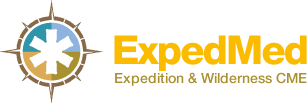 Hey guys.
Hey guys.
Here at ExpedMed we've been working hard to put together yet another great conference agenda for our annual Expedition Medicine National Conference this September 28-30, 2012.
Since 2007 we've had this event in Washington, DC and we're pleased to announce the 2012 agenda. There are a few new names on the speaker list, and over the next few weeks we'll be introducing you to some of our new lecturers.
For those who want to make sure not to miss this exceptional eduational opportunity, we're already taking registrations. The event will once again be at the Omni Shoreham Hotel in downtown DC, and will cover many important topics related to medical care on expeditions and in remote locations.
So, without further ado, here's the agenda for our 2012 ExpedMed event in Washington, DC. Remember, all participants will receive 20 hours of Category I CME credits and our 700 page hardback textbook Expedition & Wilderness Medicine, free of charge.
September 28th, Friday
8:00-10:00am The Expedition Medical Kit, Michael Callahan
9:00-10:00am Travel Immunizations, David Townes
10:00-10:30am Break
10:30-11:30am Living and Working Abroad, Gregory Bledsoe
11:30-12:30 High Altitude Medicine I, Peter Hackett
12:30-2pm Lunch
2:00pm-3:00pm Wilderness Medicine EMS, Will Smith
3:00pm-4:00pm High Altitude Medicine II, Peter Hackett
4:00-4:30pm Break
4:30-5:30pm Wilderness Mass Casualty Incident, Will Smith
5:30pm-6:30pm Disaster Medicine, Christina Catlett
September 29th, Saturday
8:00-9:00am Medical Direction in the Wilderness, Will Smith
9:00-10:00am Patients at Altitude, Peter Hackett
10:00-10:30am Break
10:30-11:30am Bringing Combat Medicine to the Wilderness, Will Smith
11:30-12:30 Malaria Prevention and Chemoprophylaxis, Alan Magill
12:30-2pm Lunch
2pm-3pm Telemedicine, David Townes
3pm-4pm Getting High for Science, Peter Hackett
4:00-4:30pm Break
4:30-5:30pm Rabies, Alan Magill
5:30pm-6:30pm Reptile Envenomations, Michael Callahan
September 30th, Sunday
8:00-9:00am Dive Medicine, Matthew Partrick
9:00-10:00am Self-Treatment for Expeditions, Alan Magill
10:00-10:30am Break
10:30-11:30am When Animals Attack, Christina Catlett
11:30-12:30 Arthropod Envenomations, Michael Callahan

